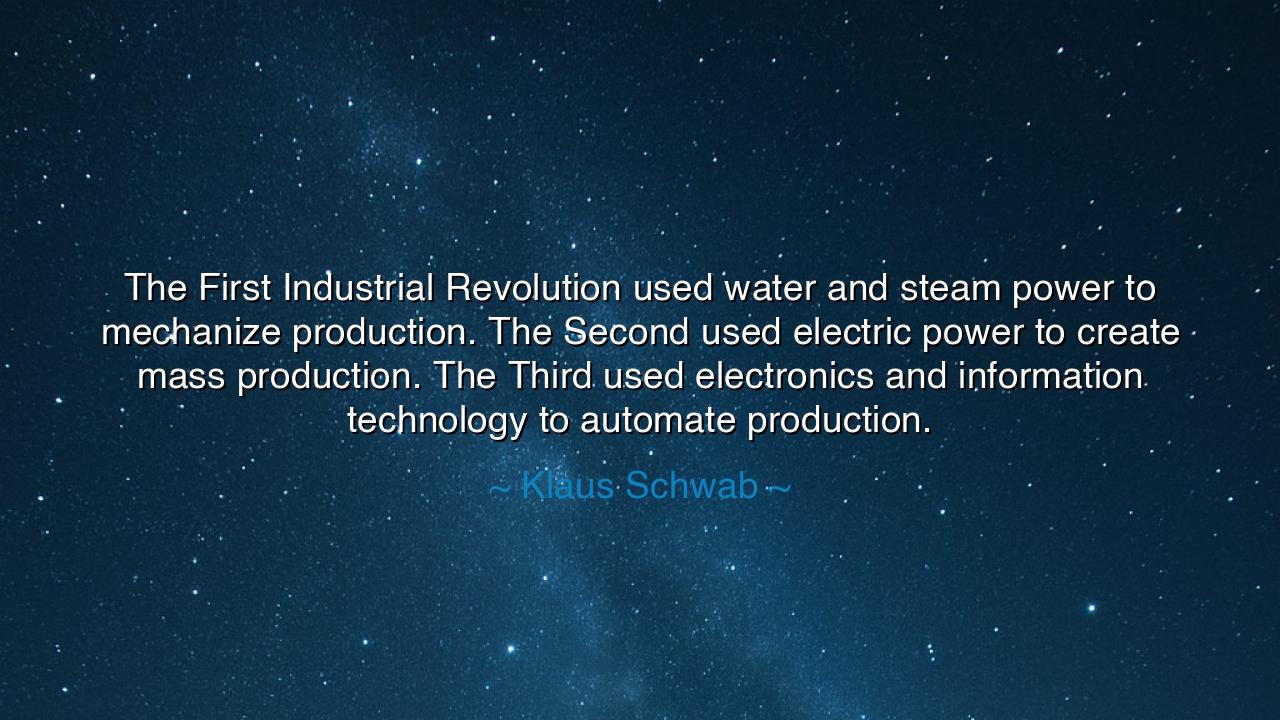
The First Industrial Revolution used water and steam power to
The First Industrial Revolution used water and steam power to mechanize production. The Second used electric power to create mass production. The Third used electronics and information technology to automate production.






Hear the words of Klaus Schwab, a thinker of our own age and founder of the World Economic Forum, who has gazed deeply into the tides of human progress. He declared: “The First Industrial Revolution used water and steam power to mechanize production. The Second used electric power to create mass production. The Third used electronics and information technology to automate production.” In these words lies a map of human destiny, carved in the sweat of workers, the sparks of invention, and the courage of those who dared to change the world.
The meaning of his teaching is profound. Humanity has always been shaped by its tools, but in these three great revolutions, the very rhythm of life was rewritten. The First Revolution, born of water and steam, broke the chains of manual labor and gave birth to factories, to locomotives, to ships that no longer feared the wind. It marked the first time man truly bent the forces of nature into relentless engines of production. Lives changed forever as handcraft yielded to the power of mechanization.
Then came the Second Revolution, heralded by electricity. It was a light in the darkness—literally and figuratively. With electricity came not only illumination, but also the power of mass production. Assembly lines rose, industries flourished, and goods once rare became available to the common man. This revolution spread wealth and comfort but also reshaped societies, drawing millions into cities, forging new nations of industry, and laying the foundations of the modern world.
The Third Revolution followed swiftly, borne on the wings of electronics and information technology. Machines became not only strong, but also intelligent in their function. Automation entered factories, and computers began to calculate, organize, and create with a speed beyond human reach. This was the revolution of microchips and networks, of satellites and software—ushering in an era where information, more than coal or steel, became the fuel of progress.
History offers us many vivid stories of these turning points. Think of James Watt, whose perfected steam engine ignited the First Revolution, powering mills and locomotives that carried the world into a new age. Think of Henry Ford, who through the assembly line made automobiles a reality for the many, not just the few, symbolizing the triumph of the Second. And think of the visionaries of Silicon Valley, whose circuits and codes transformed communication, commerce, and creativity, embodying the Third. Each name, each invention, stands as a monument to the revolutions Schwab describes.
Yet, the deeper meaning of Schwab’s words is not merely to recount history, but to awaken us to our role within it. These revolutions were not accidents—they were born of vision, discipline, and courage. And each carried both blessings and burdens. Mechanization lifted production but enslaved some in harsh factory conditions. Mass production brought abundance but also waste and conflict. Automation freed hands but threatened livelihoods. Thus, every revolution is both promise and peril, demanding wisdom to guide its power.
The lesson for all is clear: stand not as passive observers of history, but as shapers of it. Understand the revolutions that came before, and recognize the one that unfolds around us now—the Fourth Industrial Revolution, where artificial intelligence, biotechnology, and connectivity will again remake the world. Approach it not with fear alone, nor blind praise, but with responsibility, ensuring that the fruits of progress are shared widely, that dignity is preserved, that humanity itself is never lost in the march of machines.
Therefore, engrave this truth upon your hearts: each revolution is a fire, and fire may warm or consume. Use it wisely. Let your vision be guided by justice, your innovations by compassion, your labor by foresight. For the story of these revolutions is not yet finished, and the pen now rests in our hands. What we write with it will be the destiny of generations yet unborn.






AAdministratorAdministrator
Welcome, honored guests. Please leave a comment, we will respond soon